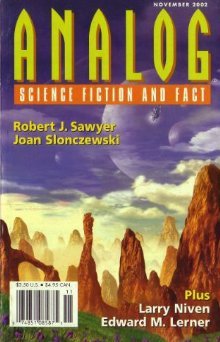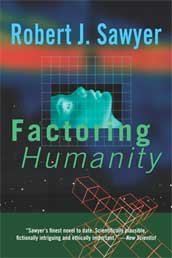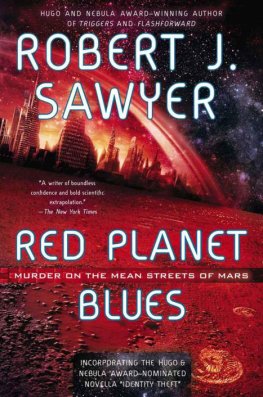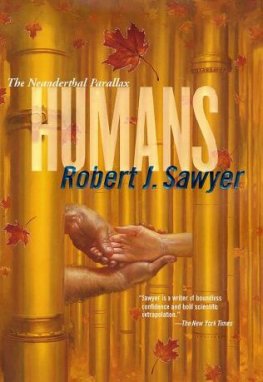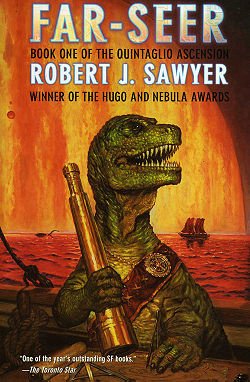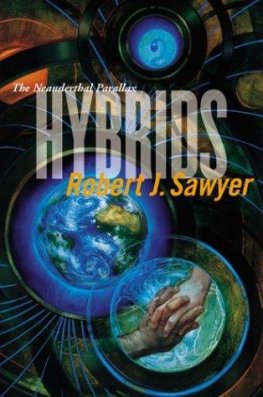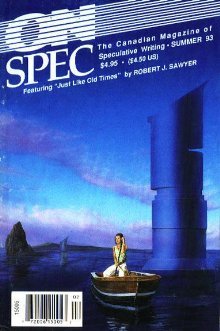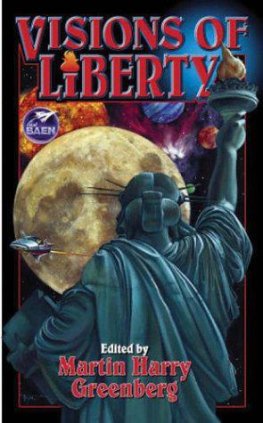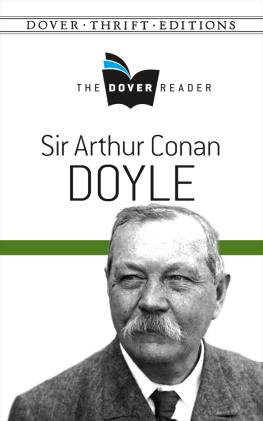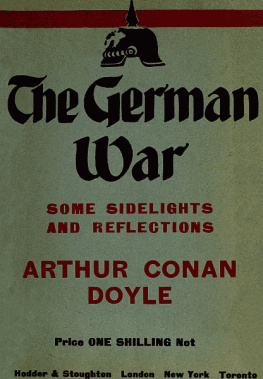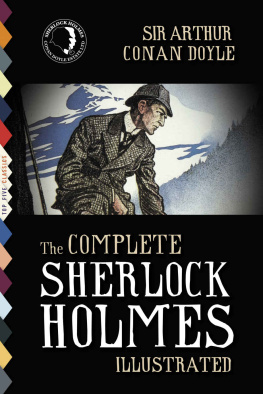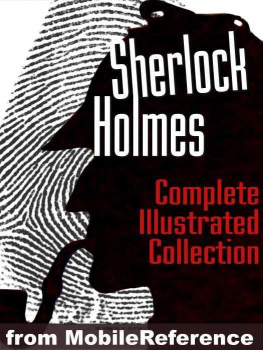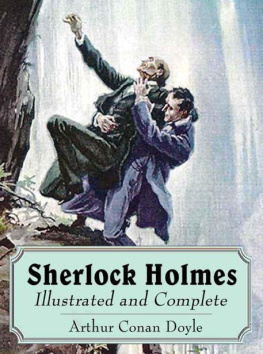You See But You Do Not Observe
by Robert J. Sawyer
I had been pulled into the future first, ahead of my companion. There was no sensation associated with the chronotransference, except for a popping of my ears which I was later told had to do with a change in air pressure. Once in the 21st century, my brain was scanned in order to produce from my memories a perfect reconstruction of our rooms at 221B Baker Street. Details that I could not consciously remember or articulate were nonetheless reproduced exactly: the flock-papered walls, the bearskin hearthrug, the basket chair and the armchair, the coal-scuttle, even the view through the window all were correct to the smallest detail.
I was met in the future by a man who called himself Mycroft Holmes. He claimed, however, to be no relation to my companion, and protested that his name was mere coincidence, although he allowed that the fact of it was likely what had made a study of my partners methods his chief avocation. I asked him if he had a brother called Sherlock, but his reply made little sense to me: My parents werent that cruel.
In any event, this Mycroft Holmes who was a small man with reddish hair, quite unlike the stout and dark ale of a fellow with the same name I had known two hundred years before wanted all details to be correct before he whisked Holmes here from the past. Genius, he said, was but a step from madness, and although I had taken to the future well, my companion might be quite rocked by the experience.
When Mycroft did bring Holmes forth, he did so with great stealth, transferring him precisely as he stepped through the front exterior door of the real 221 Baker Street and into the simulation that had been created here. I heard my good friends voice down the stairs, giving his usual glad tidings to a simulation of Mrs. Hudson. His long legs, as they always did, brought him up to our humble quarters at a rapid pace.
I had expected a hearty greeting, consisting perhaps of an ebullient cry of My Dear Watson, and possibly even a firm clasping of hands or some other display of bonhomie. But there was none of that, of course. This was not like the time Holmes had returned after an absence of three years during which I had believed him to be dead. No, my companion, whose exploits it has been my honor to chronicle over the years, was unaware of just how long we had been separated, and so my reward for my vigil was nothing more than a distracted nodding of his drawn-out face. He took a seat and settled in with the evening paper, but after a few moments, he slapped the newsprint sheets down. Confound it, Watson! I have already read this edition. Have we not todays paper?
And, at that turn, there was nothing for it but for me to adopt the unfamiliar role that queer fate had dictated I must now take: our traditional positions were now reversed, and I would have to explain the truth to Holmes.
Holmes, my good fellow, I am afraid they do not publish newspapers anymore.
He pinched his long face into a scowl, and his clear, gray eyes glimmered. I would have thought that any man who had spent as much time in Afghanistan as you had, Watson, would be immune to the ravages of the sun. I grant that today was unbearably hot, but surely your brain should not have addled so easily.
Not a bit of it, Holmes, I assure you, said I. What I say is true, although I confess my reaction was the same as yours when I was first told. There have not been any newspapers for seventy-five years now.
Seventy-five years? Watson, this copy of The Times is dated August the fourteenth, 1899 yesterday.
I am afraid that is not true, Holmes. Today is June the fifth, anno Domini two thousand and ninety-six.
Two thou
It sounds preposterous, I know
It is preposterous, Watson. I call you `old man now and again out of affection, but you are in fact nowhere near two hundred and fifty years of age.
Perhaps I am not the best man to explain all this, I said.
No, said a voice from the doorway. Allow me.
Holmes surged to his feet. And who are you?
My name is Mycroft Holmes.
Impostor! declared my companion.
I assure you that that is not the case, said Mycroft. I grant Im not your brother, nor a habitu of the Diogenes Club, but I do share his name. I am a scientist and I have used certain scientific principles to pluck you from your past and bring you into my present.
For the first time in all the years I had known him, I saw befuddlement on my companions face. It is quite true, I said to him.
But why? said Holmes, spreading his long arms. Assuming this mad fantasy is true and I do not grant for an instant that it is why would you thus kidnap myself and my good friend, Dr. Watson?
Because, Holmes, the game, as you used to be so fond of saying, is afoot.
Murder, is it? asked I, grateful at last to get to the reason for which we had been brought forward.
More than simple murder, said Mycroft. Much more. Indeed, the biggest puzzle to have ever faced the human race. Not just one body is missing. Trillions are. Trillions.
Watson, said Holmes, surely you recognize the signs of madness in the man? Have you nothing in your bag that can help him? The whole population of the Earth is less than two thousand millions.
In your time, yes, said Mycroft. Today, its about eight thousand million. But I say again, there are trillions more who are missing.
Ah, I perceive at last, said Holmes, a twinkle in his eye as he came to believe that reason was once again holding sway. I have read in The Illustrated London News of these dinosauria, as Professor Owen called them great creatures from the past, all now deceased. It is their demise you wish me to unravel.
Mycroft shook his head. You should have read Professor Moriartys monograph called The Dynamics of an Asteroid, he said.
I keep my mind clear of useless knowledge, replied Holmes curtly.
Mycroft shrugged. Well, in that paper Moriarty quite cleverly guessed the cause of the demise of the dinosaurs: an asteroid crashing into earth kicked up enough dust to block the sun for months on end. Close to a century after he had reasoned out this hypothesis, solid evidence for its truth was found in a layer of clay. No, that mystery is long since solved. This one is much greater.
And what, pray, is it? said Holmes, irritation in his voice.
Mycroft motioned for Holmes to have a seat, and, after a moments defiance, my friend did just that. It is called the Fermi paradox, said Mycroft, after Enrico Fermi, an Italian physicist who lived in the twentieth century. You see, we know now that this universe of ours should have given rise to countless planets, and that many of those planets should have produced intelligent civilizations. We can demonstrate the likelihood of this mathematically, using something called the Drake equation. For a century and a half now, we have been using radio wireless, that is to look for signs of these other intelligences. And we have found nothing nothing! Hence the paradox Fermi posed: if the universe is supposed to be full of life, then where are the aliens?
Aliens? said I. Surely they are mostly still in their respective foreign countries.
Mycroft smiled. The word has gathered additional uses since your day, good doctor. By aliens, I mean extraterrestrials creatures who live on other worlds.
Like in the stories of Verne and Wells? asked I, quite sure that my expression was agog.
And even in worlds beyond the family of our sun, said Mycroft.
Holmes rose to his feet. I know nothing of universes and other worlds, he said angrily. Such knowledge could be of no practical use in my profession.
I nodded. When I first met Holmes, he had no idea that the Earth revolved around the sun. I treated myself to a slight chuckle. He thought the reverse to be true.


